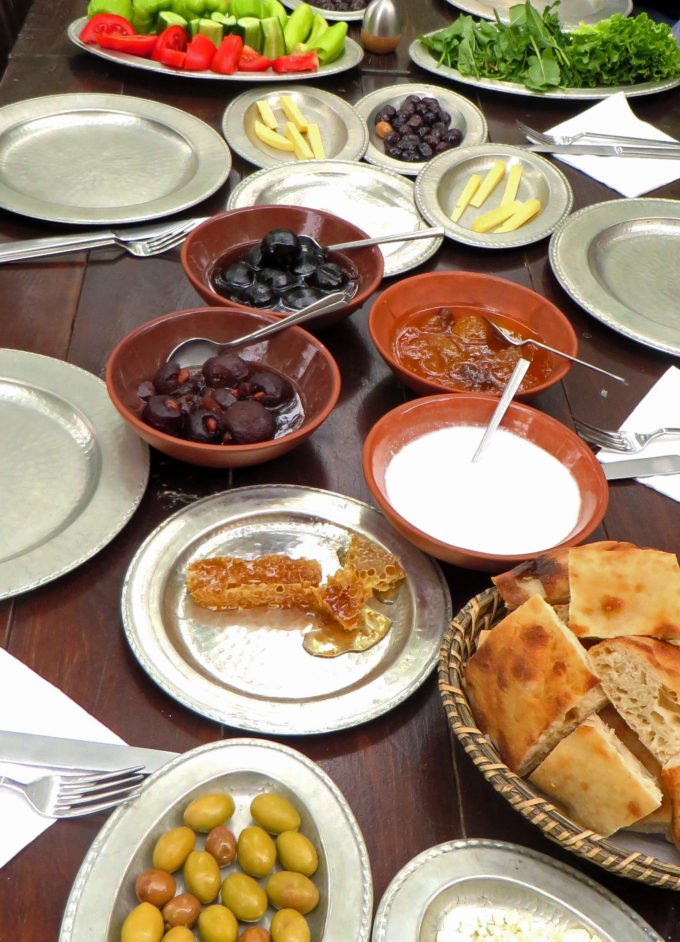
Back to the Land, Back to the Future

Back to the Land, Back to the Future
Farm-Fresh Eggs in Cappadocia
It is an unseasonably cold morning in Cappadocia, but despite the gray skies, eleven other hungry tourists and I follow Ali Yavuz on a trek to his family’s 400-year-old farm for breakfast. I note—with gentle annoyance—that Yavuz is deceptively youthful for his 44 years. Dressed in jeans and a sweatshirt, he scrambles down the side of a valley, while I—all of 24 years—hesitate on the precipitous steps cut into the rock face. As Yavuz lends a hand to us less-nimble beings, he assures us that the trek will be worthwhile.
He isn’t lying. The landscape looks like the set of a science fiction movie. The jagged canyons, desert colors, and feeling of desolation seem more appropriate on the face of the moon than in 21st-century Turkey. However, as our company rounds a bend in the valley this ancient world gives way to a Garden of Eden. Rows of grape vines grow in the shade of lush apricot, orange, and walnut trees, dogs and chickens chase each other around the farmyard, and lambs graze lazily in a nearby pasture.
Yavuz’s aunts greet us warmly and rush to set a table with an outdoor organic breakfast feast. In contrast to the jean-clad Yavuz, these women wear the billowy pants and colorful shawls of a bygone generation of Turks. Their weathered faces and hands speak to a lifetime of farm labor.
We seat ourselves at a long, wooden table heaped with crisp cucumbers and peppers, plump olives, farm-fresh eggs scrambled with herbs and vegetables, an array of jams, honey still on the comb, sweet butter, warm bread, hearty cheeses, and, of course, an unending supply of Turkish tea. As we tuck in, Yavuz explains that his family grew everything on the table using the same farming methods his ancestors employed hundreds of years ago. The food is simple, but unbelievably fresh and flavorful, and it takes no more than 20 minutes for my fellow adventurers and I to demolish the offerings.
Located in central Turkey, modern Cappadocia is very much a product of its geographical history. Around 30 million years ago, eruptions from the three volcanoes that, to this day, dominate the Cappadocian horizon covered the plain in a soft ash. This ash then compressed into rock, which over time eroded into the distinctive canyons and “fairy chimneys” that draw tourists like me from around the world. Cappadocia’s rich, volcanic soil made it ideal for agricultural production. The region’s early inhabitants nurtured crops with pigeon guano, the longtime secret to Cappadocian agricultural success. Untouched, this agricultural tradition endured for thousands of years.
Attracted by the region’s geographical wonders and budget adventures, tourists arrived en masse in Cappadocia in the 1980s. With the influx of tourism came an exodus of locals. For the first time in the region’s history, young Turks traveled to Europe for educational and employment opportunities. Most never returned home.
With no one to work the farms, local families turned to the booming tourism industry. Such was the case with Yavuz, who opened the Kelebek Hotel in 1992. Those few families who continued to farm through the tourist boom embraced modern means of production that decreased the labor necessary to produce a harvest. Within two decades, all traces of a once vibrant and unique agricultural tradition disappeared.
The cultural shift is tangible. As I make my way home from breakfast, I notice other small farms that lie fallow, dusty, and abandoned, accentuating the already barren landscape. I pass a cave city that feels almost kitschy, and I am starkly aware that many local families can no longer afford to live in the towns they once called home. Yes, I marvel at the region’s exotic beauty, but the rawness that attracted early travelers is quickly fading.
Yavuz’s farm runs on ancient wisdom and human labor instead of pesticides and heavy machinery. His aunts speak no English, yet their graciousness translates easily. They adhere resolutely to tradition and share the fruits of their labors with strangers.
However, it is not nostalgia that made Ali’s breakfast so satisfying to me; rather, it is his vision of the future where culture can survive change. He is showing that traditional, organic farming is good for the land, good for the community, good for the country, and, perhaps most importantly, exquisitely tasty.